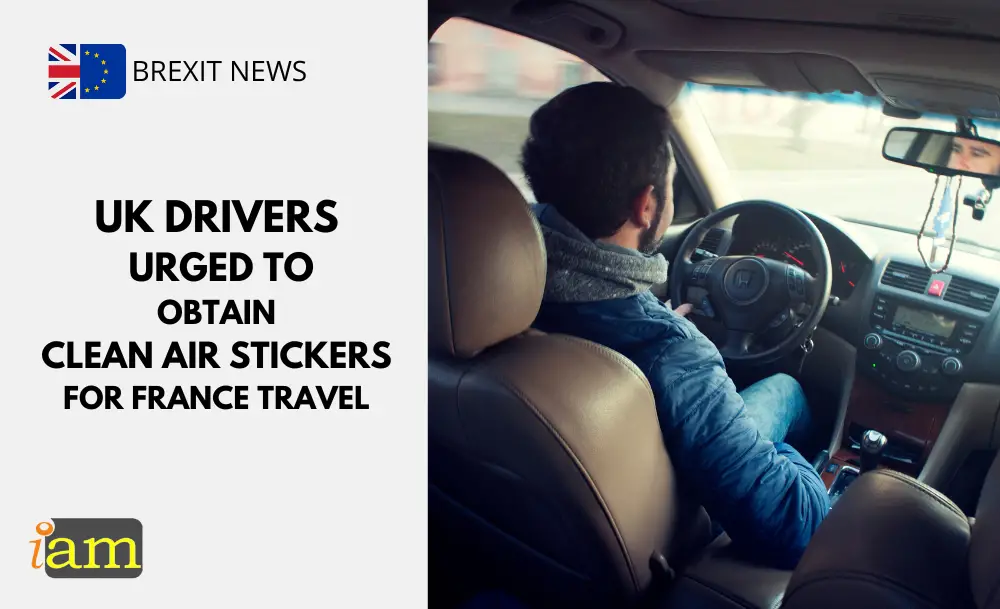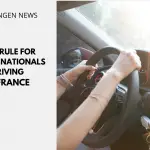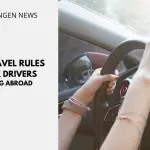UK Drivers Urged to Obtain Clean Air Stickers for France Travel

France continues to captivate British tourists and its proximity to the UK makes France an irresistible and easy getaway for British holidaymakers.
British holidaymakers planning to drive in France this summer are being advised to apply for a crucial document at least 10 days before their trip to avoid hefty fines.
Failure to do so could result in a fine of up to €180 (£155).
Clean Air stickers (known as Crit’Air vignettes) are essential yet often overlooked documentation required for driving in many French cities.
There are 6 categories of certificates, each with a different colour, to encourage the least polluting vehicles. The Crit'Air sticker concerns all vehicles: private cars, two-wheelers, tricycles and quadricycles, light commercial vehicles, and heavy vehicles including buses and coaches.
Available for just €3.72, these stickers can be ordered online through the official French Government website. They indicate a vehicle's emission level based on its Euro emissions standard and aim to reduce CO2 emissions across France.
Foreign motorists are required to display their Crit’Air sticker at all times while driving in Paris and many other zones including Lyon, Aix-Marseille, Toulouse, Nice, Montpellier, Strasbourg, Grenoble, Rouen, Reims, and Saint-Étienne.
Crucially, Crit’Air stickers can take up to 10 days to arrive in the post so holidaymakers must apply as soon as possible before driving their vehicle in France.
Once a sticker has been obtained, it is valid for the lifecycle of that vehicle.
From 2025, all cities and agglomerations with more than 150,000 inhabitants will be required to introduce a Low Emission Mobility Zone.
The Clean Air website warns: “The cost is 3.70€ plus postage. The estimated delivery time is 5 to 10 days. Please note that offending vehicles will be fined 68€ for a private car and 135€ for a coach.”
By ensuring compliance with these regulations, British drivers can enjoy their holidays in France without the risk of fines or disruptions.
Driving In The EU In 2024 As A Tourist
As a UK tourist, taking your car to mainland Europe offers unparalleled freedom and flexibility. However, there are some important updates and requirements regarding documentation you should be aware of to ensure a smooth journey. Here are the latest guidelines for driving in the EU in 2024.
National Identifier Change: From 28 September 2021, the distinguishing mark displayed on vehicles registered in the United Kingdom changed from “GB” to “UK.” This means all UK-registered vehicles driving abroad (excluding the Republic of Ireland) must display the letters “UK.” This identifier can be incorporated into your vehicle's number plates along with the Union flag, or it can be a separate sticker.
Driving Licence: Always carry your UK driving licence when driving in the EU. An international driving permit (IDP) is generally not required for visits to EU countries, Switzerland, Iceland, or Liechtenstein. However, you might need an IDP if you have:
- A paper driving licence
- A licence issued in Gibraltar, Guernsey, Jersey, or the Isle of Man
For those falling into these categories, it's advisable to check with the embassy of the country you're visiting to determine if an IDP is necessary. IDPs can be purchased from certain branches of the Post Office for £5.50. If your trip involves driving through multiple countries (e.g., driving through France to reach Spain), you may need different versions of the IDP.
Vehicle Documentation: When taking your vehicle to the EU for less than 12 months, ensure you carry a document proving ownership or a leasing agreement. This includes having your vehicle log book (V5C) or a VE103 form, which shows you’re allowed to use a hired or leased vehicle abroad.
| Documentation | Time to obtain or replace |
| A valid full driving licence and national insurance number. | Allow three weeks. If you want to tow a caravan over 750kg abroad, you’ll also need to update your licence to show that you can drive category BE. This is free. More information can be found here. |
| A copy of your DVLA driver record and licence check code. | You can get this immediately on the Government website but each licence check code is only valid for three weeks. |
| The vehicle's V5C or log book (the original version, not a copy). | Usually within five working days, but this could be longer. |
| Proof of motor insurance (don’t forget to check if your policy covers you abroad, as some will only provide third-party cover when driving in Europe. This means that you won’t be covered for issues like accidental damage). Check if you need to tell your insurer you plan to drive abroad. This information should be found on your policy documents. | Up to four days. |
| Check if you need a green card. Green cards are no longer required when driving in many countries in Europe. However, drivers will need a green card for their vehicle AND caravan in the following places: Anywhere outside of the European Economic Area – Albania – Azerbaijan – Belarus – Moldova – Russia – Turkey – Ukraine If travelling in other countries, you may need additional insurance for your caravan. Check this with your provider. | Up to six weeks. |
| An International Driving Permit (IDP) if you’re driving outside Europe. You may also need an IDP to drive in some EU countries and Norway if you have a paper driving licence or a licence issued in Gibraltar, Guernsey, Jersey, or the Isle of Man. | You can get an IDP over the counter at a Post Office. They cost £5.50. A 1926 or 1949 permit lasts for 12 months. A 1968 permit lasts for 3 years or until your UK driving licence expires, whichever comes first. |
| Your passport(s). | Allow 3 weeks. You must not travel if your passport has less than six months before expiry. It costs £88.50 to renew or replace a British passport if you apply online or £100 if you fill in a paper form. |
| Your travel insurance documents. | You should be able to access these immediately by calling your insurance provider. |
| A visa if travelling outside of designated visa-free access countries. | This varies depending on the country you are travelling to. Check with the relevant embassy at least two months prior to travel. |
| A “clean air” Crit’air sticker if you are driving in France. | 10 days. This costs €3.72 for the sticker and postage. You can check if you need one and apply here. |
| A UK identifier sticker for your number plate. You will need two if you are towing a caravan. | These can be purchased over the counter in many UK shops. |
Insurance and Accident Claims: If you're involved in a road traffic accident in an EU or EEA country, you may not be able to claim a UK-based claims representative or the UK Motor Insurers’ Bureau (MIB). Instead, you might have to bring a claim against the driver or the insurer of the vehicle in the country where the accident occurred, which could involve navigating legal procedures in the local language.
In the event of an accident caused by an uninsured or untraced driver, compensation varies by country. Therefore, it’s crucial to understand the specific regulations of the country you're driving in.
For more detailed information, always check the latest guidelines on the gov.uk website before you travel.
Do you need to renew your passport? Talk to us in the comment section below. Or if you need more advice on the above, contact us for further travel & immigration advice.
Check out the deals we have found below and tell us your travel plans.
Check out the offers and discounts from:
And because of the pandemic, don’t forget to get your travel insurance, which will cover you for flight disruptions and pandemic related matters.
IaM can help with your visa application to Europe, the United States, the UK & other countries
If you need help with a US visa, a UK Visa, or a visa to Europe, including help with appointment booking obligations, IaM can help. For more information and advice on US immigration, UK immigration law and US visa applications or if you need any help or assistance please, reach out to your Visa Coordinator at IaM.
Some of our posts include affiliate links. If you choose to purchase any of these products, we might get a small commission. For more information, check out our TOS.
- Europe Opens Doors To Top US Researchers - 1 June 2025
- UK Tourists Urged to Prepare for EES Fingerprint Checks at EU Borders - 31 May 2025
- UK Holiday Drivers in Europe Could Soon Be Fined at Home - 30 May 2025










